Bald Eagle Habitat
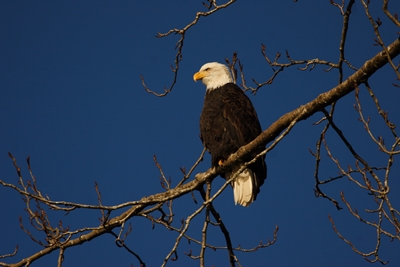
Learn more about what makes good bald eagle habitat and how to recognize their presence. This
magnificent species was until recently an endangered species. It is a powerful predator and scavenger,
feeding on fish, birds, some mammals and carrion. These huge birds grow to between
30 and 36 inches in length, with a wingspan of 6.5 to 7 feet! Adults have dark bodies and wings, with
distinctly white heads and tails. Juvenile birds are uniformly dark or mottled with some pale areas
overall.
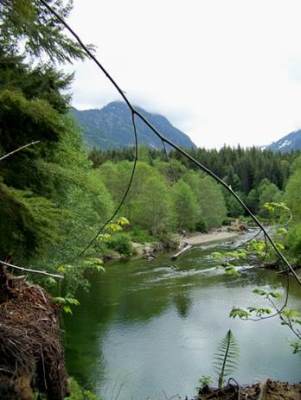
What makes good bald eagle habitat?
This eagle species is nearly always tied to productive
waterways, such as rivers, lakes, reservoirs and saltwater bays. Rivers that
have runs of fish such as shad or salmon may have the densest populations of
bald eagles. Generally speaking,
healthier, cleaner waterways have more bald eagles.
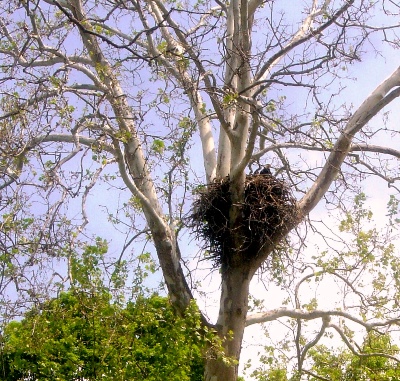
These birds require tall, thick trees to use as nesting
sites. Their nests can be huge, often 4-5 feet across and 3-5 feet tall. The largest bald eagle nest ever recorded was
over 9 feet wide and nearly 20 feet tall.
That nest weighed in at over two tons!
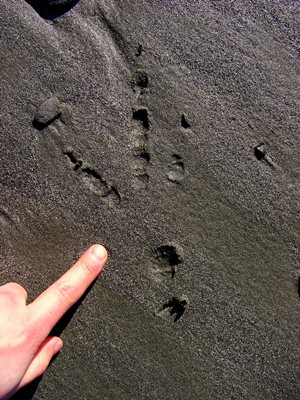
Bald Eagle Tracks and Sign
The tracks of bald eagles are very large, muscular and show marks from their long talons. Like typical (anisodactyl) bird tracks, eagles tracks show 3 toes forward and 1 toe facing backward. Similar to the tracks of much smaller ravens and crows, eagle tracks show the forward inner and middle toes closer together and one forward toe to the outside.
Eagle tracks measure 6 to 7.5 inches long!
Be More Prepared For Your Next Outdoor Adventure!
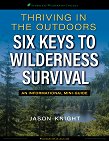
Don't leave home without knowing these six essential survival skills. Our free survival mini guide reveals the strategies of:
- Shelter & fire to prevent the number one cause of death
- Obtaining clean water to avoid life-threatening dehydration
- Common wild survival foods and other critical skills!

Typically, when on the ground, eagles walk and sometimes
hop. They are heavy and not very fast on the ground. Their trails are most
commonly encountered in the sand or silt along major rivers.
Salmon carcasses fed on by bald eagles often have the fish's spine and head intact (whereas ospreys feeding on salmon often leave no remains).
Primary feathers from a bald eagle are dark-colored (with white splotches on juveniles) and are 14 to 20 inches in length. They lack the "melted plastic"-looking patch (tegmen) on the inner side that geese feathers have. Keep in mind that it is against the law to possess eagle feathers, or any other migratory bird feathers or parts, without a permit.
Additional Resources:
National Wildlife Federation information on Bald Eagles
US Fish & Wildlife Bald Eagle Fact Sheet
Related Courses:
Wildlife Tracking Courses at Alderleaf
By the way, when you're out birding, it's important to know how to stay safe in the outdoors, especially if you were to get lost. Right now you can get a free copy of our mini survival guide here, where you'll discover six key strategies for outdoor emergencies, plus often-overlooked survival tips.

About the Author: Filip Tkaczyk is a periodic guest teacher at Alderleaf. He also wrote the field guide Tracks & Sign of Reptiles & Amphibians. Learn more about Filip Tkaczyk.
Return from Bald Eagle Habitat back to Wildlife Tracking Articles
Is The Essential Wilderness Survival Skills Course Right for You? Take the "Online Survival Training Readiness" Quiz
See for yourself if this eye-opening course is a good fit for you. It takes just a few minutes! Get your Survival Training Readiness Score Now!

Grow Your Outdoor Skills! Get monthly updates on new wilderness skills, upcoming courses, and special opportunities. Join the free Alderleaf eNews and as a welcome gift you'll get a copy of our Mini Survival Guide.

 The Six Keys to Survival: Get a free copy of our survival mini-guide and monthly tips!
The Six Keys to Survival: Get a free copy of our survival mini-guide and monthly tips!
Learn more